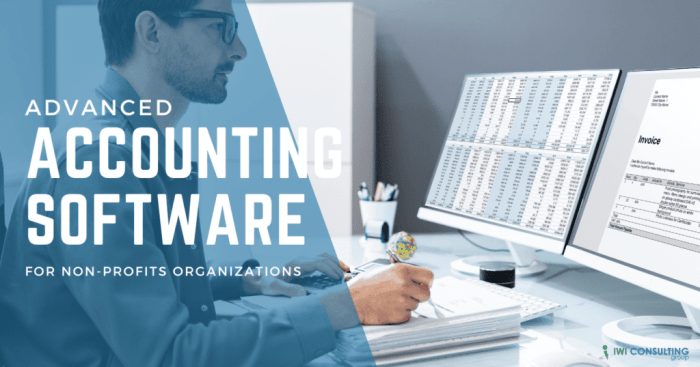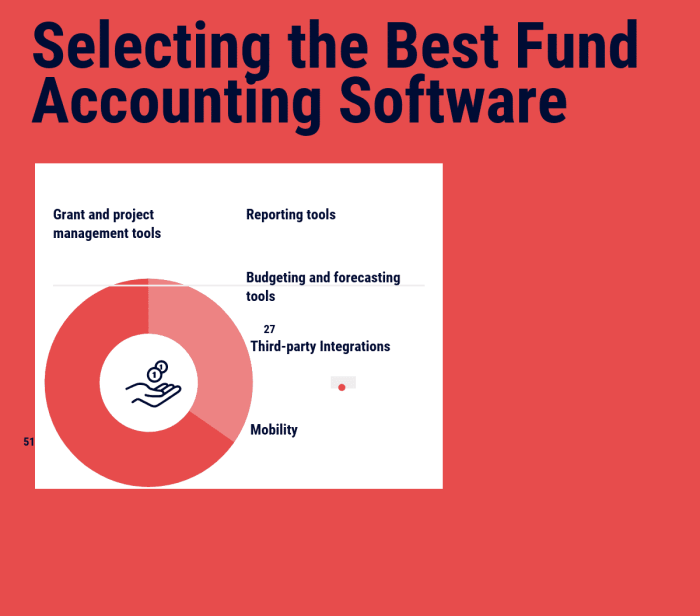Non profit accounting software – Managing the finances of a nonprofit organization requires meticulous attention to detail and adherence to strict regulatory guidelines. Unlike for-profit businesses, nonprofits operate under a different set of accounting principles and often face unique challenges in managing their funds. This is where specialized nonprofit accounting software becomes invaluable. This comprehensive guide explores the key features, benefits, and considerations when choosing the right software to streamline your organization’s financial operations.
We’ll cover topics such as budget management, grant tracking, donor management, and reporting, alongside crucial considerations for selecting and implementing the best fit for your specific needs.

Source: iwigroup.ca
Understanding the Unique Needs of Nonprofit Accounting: Non Profit Accounting Software
Nonprofit accounting differs significantly from for-profit accounting. Nonprofits must adhere to specific accounting standards, often involving stricter regulations and greater transparency requirements. Key distinctions include:
- Focus on Mission Accomplishment: Financial reporting emphasizes the organization’s progress towards its mission, not just profitability.
- Grant Management: Nonprofits often rely heavily on grants, requiring robust tracking of funds, reporting requirements, and deadlines.
- Donor Management: Effective donor relationship management is crucial for fundraising success, necessitating detailed records of donations and communication history.
- Compliance and Auditing: Stringent regulations and the need for regular audits demand accurate and auditable financial records.
- Restricted vs. Unrestricted Funds: Nonprofits often manage funds with specific restrictions on their use, requiring careful tracking and reporting.
Key Features of Nonprofit Accounting Software
Effective nonprofit accounting software should address the unique needs Artikeld above. Essential features include:
Fund Accounting
This is arguably the most critical feature. It allows for the segregation of funds based on their source and restrictions, ensuring compliance and accurate reporting. The software should facilitate the tracking of restricted and unrestricted funds, enabling clear visibility into how donations and grants are utilized.
Grant Management
Robust grant management capabilities are essential. The software should streamline the entire grant lifecycle, from application and award tracking to budget monitoring and reporting. Features like automated reminders for deadlines and progress reports significantly reduce administrative burden.
Donor Management, Non profit accounting software
Effective donor management is crucial for fundraising success. The software should enable the tracking of donor information, donation history, communication preferences, and pledge fulfillment. This allows for personalized communication and strengthens donor relationships.
Budgeting and Forecasting
Nonprofits need tools to create and manage budgets effectively. The software should facilitate the creation of detailed budgets, track actual spending against budgeted amounts, and provide forecasting capabilities to anticipate future financial needs.
Reporting and Analytics
Comprehensive reporting is essential for demonstrating accountability and transparency. The software should generate various reports, including financial statements, grant reports, donor reports, and customized reports tailored to specific needs. Robust analytics capabilities allow for data-driven decision-making.
Audit Trails and Security
Maintaining a secure and auditable record of all financial transactions is paramount. The software should provide robust security features and detailed audit trails to ensure data integrity and compliance with regulations.
Choosing the Right Nonprofit Accounting Software
Selecting the right software involves careful consideration of several factors:
- Organization Size and Complexity: The software’s scalability should match the organization’s size and complexity.
- Budget: Software options range from free or low-cost to expensive enterprise solutions.
- Features and Functionality: Prioritize features that address the organization’s specific needs.
- Ease of Use and User Interface: The software should be intuitive and user-friendly for staff with varying levels of accounting expertise.
- Integration with Other Systems: Consider integration with existing systems, such as CRM or fundraising platforms.
- Customer Support and Training: Reliable customer support and training resources are crucial for successful implementation.
- Security and Compliance: Ensure the software meets relevant security and compliance standards.
Popular Nonprofit Accounting Software Options
Several reputable software options cater specifically to the needs of nonprofits. Researching and comparing features, pricing, and user reviews is crucial before making a decision. Some examples include (but are not limited to):
- DonorPerfect: Known for its strong donor management capabilities.
- Blackbaud Financial Edge: A comprehensive solution for larger organizations.
- Aplos: A popular choice for smaller nonprofits.
- QuickBooks Online Nonprofit Edition: A user-friendly option integrated with other QuickBooks tools.
- Xero: While not exclusively for nonprofits, Xero offers adaptable features suitable for many organizations.
Implementing and Maintaining Nonprofit Accounting Software
Successful implementation requires careful planning and execution. Key steps include:
- Data Migration: Transferring existing financial data accurately and efficiently.
- User Training: Providing adequate training to staff to ensure proficient use of the software.
- Ongoing Maintenance: Regular updates and maintenance are essential to keep the software running smoothly and securely.
- Regular Reviews: Periodically review the software’s effectiveness and adapt as needed.
Frequently Asked Questions (FAQ)
- Q: What is the difference between fund accounting and general accounting? A: Fund accounting tracks money based on its source and restrictions (e.g., grants, donations), while general accounting focuses on overall financial performance.
- Q: Is cloud-based nonprofit accounting software secure? A: Reputable cloud-based software providers employ robust security measures to protect data.
- Q: How much does nonprofit accounting software cost? A: Costs vary widely depending on the features, organization size, and provider.
- Q: Can I use standard accounting software for my nonprofit? A: While possible, specialized nonprofit software offers features tailored to the unique needs of nonprofits.
- Q: What are the key compliance considerations for nonprofit accounting? A: Compliance varies by location but often involves adhering to specific accounting standards (e.g., GAAP for US-based nonprofits) and maintaining accurate records for audits.
Conclusion
Choosing and implementing the right nonprofit accounting software is a crucial step in ensuring the financial health and sustainability of your organization. By carefully considering your needs, researching available options, and planning for implementation and ongoing maintenance, you can leverage technology to improve efficiency, enhance transparency, and ultimately, further your organization’s mission.
Call to Action
Ready to streamline your nonprofit’s finances? Explore the software options mentioned above and find the perfect fit for your organization’s unique needs. Start your search today and experience the benefits of efficient and compliant financial management!

Source: predictiveanalyticstoday.com
Top FAQs
What are the key features to look for in nonprofit accounting software?
Key features include donor management, grant tracking, fund accounting, budget management, reporting capabilities (including customizable reports), and integration with other systems.
Is cloud-based software better than on-premise software for nonprofits?

Source: nav.com
Cloud-based software offers advantages such as accessibility, scalability, and reduced IT infrastructure costs. However, on-premise solutions might be preferred by organizations with specific security concerns or limited internet access.
How much does nonprofit accounting software typically cost?
Pricing varies greatly depending on the features, scale, and vendor. Some offer free plans for smaller organizations, while others charge monthly or annual subscriptions based on usage or the number of users.
